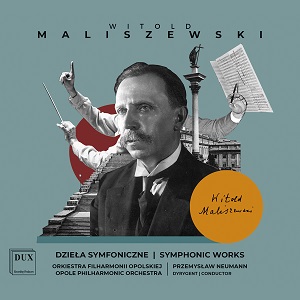
Witold Maliszewski Symphonies — Treasures from Two Nations
I think Witold Maliszewski qualifies as a national musical treasure for not one, but two countries. He made enormous contributions to both Poland and Russia. Not just as a composer, but also as a teacher, conductor, and administrator. It’s a remarkable tale.
As a youngster in Poland, Maliszewski studied with Russian composer Mikhail Ipplitov-Ivanov. He then went to Russia. There he studied orchestration with Nikolay Rimsky-Korsakov and musical forms with Alexander Glazunov.
These composers provided Maliszewski with a solid foundation for his own work. But Maliszewski had another talent. He was an able administrator and a passionate teacher.
He moved to Odessa where he founded a music conservatory (only the fourth in Russia). There Maliszewski developed a thriving classical music scene within the city. He also taught, conducted, and managed to write a seminal textbook on harmony.
It all came to an abrupt end in 1921. The Bolshevik’s rise to power meant a rise in anti-Polish violence. Maliszewski returned to Poland, where he started over. He joined the Warsaw Conservatory and helped organize the Chopin Piano Competition. He also reorganized the State Music Conservatory system. Russia’s loss was Poland’s gain. He also taught Witold Lutaslawski, one Poland’s greatest composers of the 20th Century.
And all the while Maliszewski composed. His music does credit to his teachers, as it does have a certain Russian quality to it. Yet Malieszweski shows an independent voice that goes beyond that foundation.
Maliszewski’s first three symphonies were composed in Russia. They’re full-bodied late-Romantic works. And while one can hear the influence of Rimsky-Korsakov and Glazunov, there’s more. Maliszewski’s harmonies have a fresh, exotic, and decidedly un-Russian sound to them.
His motifs are well-constructed, and the symphonies unfold in a straightforward manner. Maliszewski’s last symphony, No. 4, is titled “To the Newborn and Recovered Homeland.” It celebrates his Polish heritage. Maliszewski uses his folk-inspired material in a sophisticated manner. It’s a beautifully written work. And it stands in stark contrast to the three previous “Russian” symphonies.
The Jozef Elsner Opole Philharmonic Orchestra gives these works some fine performances. The ensemble sound is big and robust. Maestro Przemyslaw Neumann keeps the energy level high. Under his direction, Maliszewski’s music maintains momentum and purpose.
Also included are some of Maliszewski’s shorter orchestral works. They show him equally at home with small-scale pieces.
I had not heard a note of Maliszewski’s music before auditioning this release. I was hooked right from the opening of the first symphony. And that experience continued with the rest of Maliszewski’s symphonies. A great collection of music by a dual-nation national treasure!
Witold Maliszewski: Symphonic Works
Opole Philharmonic Orchestra; Przemyslaw Neumann, conductor
DUX 1716-18
3 CD Set

